- Home
- Haruki Murakami
The Wind-Up Bird Chronicle Page 7
The Wind-Up Bird Chronicle Read online
Page 7
“Is this one of those times when there’s no flow?” Kumiko asked.
“How’s that?”
“IS THIS ONE OF THOSE TIMES WHEN THERE’S NO FLOW?” Kumiko shouted.
“No flow now,” Mr. Honda said, nodding to himself. “Now’s the time to stay still. Don’t do anything. Just be careful of water. Sometime in the future, this young fellow could experience real suffering in connection with water. Water that’s missing from where it’s supposed to be. Water that’s present where it’s not supposed to be. In any case, be very, very careful of water.”
Kumiko, beside me, was nodding with the utmost gravity, but I could see she was struggling not to laugh.
“What kind of water?” I asked.
“I don’t know,” said Mr. Honda. “Water.”
On the TV, some university professor was saying that people’s chaotic use of Japanese grammar corresponded precisely to the chaos in their lifestyles. “Properly speaking, of course, we cannot call it chaos. Grammar is like the air: someone higher up might try to set rules for using it, but people won’t necessarily follow them.” It sounded interesting, but Mr. Honda just went on talking about water.
“Tell you the truth, I suffered over water,” he said. “There was no water in Nomonhan. The front line was a mess, and supplies were cut off. No water. No rations. No bandages. No bullets. It was awful. The big boys in the rear were interested in only one thing: occupying territory as fast as possible. Nobody was thinking about supplies. For three days, I had almost no water. If you left a washrag out, it’d be wet with dew in the morning. You could wring out a few drops to drink, but that was it. There was just no other water at all. I wanted to die, it was so bad. Being thirsty like that is the worst thing in the world. I was ready to run out and take a bullet. Men who got shot in the stomach would scream for water. Some of them went crazy with the thirst. It was a living hell. We could see a big river flowing right in front of us, with all the water anybody could ever drink. But we couldn’t get to it. Between us and the river was a line of huge Soviet tanks with flamethrowers. Machine gun emplacements bristled like pincushions. Sharpshooters lined the high ground. They sent up flares at night. All we had was Model 38 infantry rifles and twenty-five bullets each. Still, most of my buddies went to the river. They couldn’t take it. Not one of them made it back. They were all killed. So you see, when you’re supposed to stay still, stay still.”
He pulled out a tissue, blew his nose loudly, and examined the results before crumpling the tissue and throwing it into the wastebasket.
“It can be hard to wait for the flow to start,” he said, “but when you have to wait, you have to wait. In the meantime, assume you’re dead.”
“You mean I should stay dead for now?” I asked.
“How’s that?”
“YOU MEAN I SHOULD STAY DEAD FOR NOW?”
“That’s it, sonny. ‘Dying is the only way / For you to float free: / Nomonhan.’ ”
He went on talking about Nomonhan for another hour. We just sat there and listened. We had been ordered to “receive his teaching,” but in a year of monthly visits to his place, he almost never had a “teaching” for us to “receive.” He rarely performed divination. The one thing he talked about was the Nomonhan Incident: how a cannon shell blew off half the skull of the lieutenant next to him, how he leaped on a Soviet tank and burned it with a Molotov cocktail, how they cornered and shot a downed Soviet pilot. All his stories were interesting, even thrilling, but as with anything else, you hear them seven or eight times and they tend to lose some of their luster. Nor did he simply “tell” his stories. He screamed them. He could have been standing on a cliff edge on a windy day, shouting to us across a chasm. It was like watching an old Kurosawa movie from the very front row of a run-down theater. Neither of us could hear much of anything for a while after we left his house.
Still, we—or at least I—enjoyed listening to Mr. Honda’s stories. Most of them were bloody, but coming from the mouth of a dying old man in a dirty old robe, the details of battle lost the ring of reality. They sounded more like fairy tales. Almost half a century earlier, Mr. Honda’s unit had fought a ferocious battle over a barren patch of wilderness on the Manchurian-Mongolian border. Until I heard about it from Mr. Honda, I knew almost nothing about the battle of Nomonhan. And yet it had been a magnificent battle. Almost bare-handed, they had defied the superior Soviet mechanized forces, and they had been crushed. One unit after another had been smashed, annihilated. Some officers had, on their own initiative, ordered their troops to retreat to avoid annihilation; their superiors forced them to commit suicide. Most of the troops captured by the Soviets refused to participate in the postwar exchange of prisoners, because they were afraid of being tried for desertion in the face of the enemy. These men ended up contributing their bones to the Mongolian earth. Sent home with an honorable discharge after he lost his hearing, Mr. Honda became a practitioner of divination.
“It was probably all to the good,” he said. “If my hearing hadn’t been ruined, I probably would have died in the South Pacific. That’s what happened to most of the troops who survived Nomonhan. Nomonhan was a great embarrassment for the Imperial Army, so they sent the survivors where they were most likely to be killed. The commanding officers who made such a mess of Nomonhan went on to have distinguished careers in central command. Some of the bastards even became politicians after the war. But the guys who fought their hearts out for them were almost all snuffed out.”
“Why was Nomonhan such an embarrassment for the army?” I asked. “The troops all fought bravely, and a lot of them died, right? Why did the survivors have to be treated so badly?”
But Mr. Honda seemed not to hear my question. He stirred and rattled his divining sticks. “You’d better be careful of water,” he said.
And so ended the day’s session.
•
After my fight with Kumiko’s father, we stopped going to Mr. Honda’s. It was impossible for me to continue visiting him, knowing it was being paid for by my father-in-law, and we were not in any position to pay him ourselves. We could barely hold our heads above water in those days. Eventually, we forgot about Mr. Honda, just as most busy young people tend to forget about most old people.
•
In bed that night, I went on thinking about Mr. Honda. Both he and Malta Kano had spoken to me about water. Mr. Honda had warned me to be careful. Malta Kano had undergone austerities on the island of Malta in connection with her research on water. Perhaps it was a coincidence, but both of them had been deeply concerned about water. Now it was starting to worry me. I turned my thoughts to images of the battlefield at Nomonhan: the Soviet tanks and machine gun emplacements, and the river flowing beyond them. The unbearable thirst. In the darkness, I could hear the sound of the river.
“Toru,” Kumiko said to me in a tiny voice, “are you awake?”
“Uh-huh.”
“About the necktie. I just remembered. I took it to the cleaner’s in December. It needed pressing. I guess I just forgot.”
“December? Kumiko, that’s over six months ago!”
“I know. And you know I never do anything like that, forgetting things. It was such a lovely necktie, too.” She put her hand on my shoulder. “I took it to the cleaner’s by the station. Do you think they still have it?”
“I’ll go tomorrow. It’s probably there.”
“What makes you think so? Six months is a long time. Most cleaners will get rid of things that aren’t claimed in three months. They can do that. It’s the law. What makes you think it’s still there?”
“Malta Kano said I’d find it. Somewhere outside the house.”
I could feel her looking at me in the dark.
“You mean you believe in what she says?”
“I’m starting to.”
“Pretty soon you and my brother might start seeing eye-to-eye,” she said, a note of pleasure in her voice.
“We just might,” I said.
I kept
thinking about the Nomonhan battlefield after Kumiko fell asleep. The soldiers were all asleep there. The sky overhead was filled with stars, and millions of crickets were chirping. I could hear the river. I fell asleep listening to it flow.
Hooked on Lemon Drops
•
Flightless Bird and Waterless Well
After doing the breakfast dishes, I rode my bike to the cleaner’s by the station. The owner—a thin man in his late forties, with deep wrinkles in his forehead—was listening to a tape of the Percy Faith orchestra on a boom box that had been set on a shelf. It was a large JVC, with some kind of extra woofers attached and a mound of cassette tapes standing by. The orchestra was performing “Tara’s Theme,” making the most of its lush string section. The owner himself was in the back of the shop, whistling along with the music as he ran a steam iron over a shirt, his movements sharp and energetic. I approached the counter and announced with suitable apologies that I had brought a necktie in late last year and forgotten to pick it up. To his peaceful little world at nine-thirty in the morning, this must have been tantamount to the arrival of a messenger bearing terrible news in a Greek tragedy.
“No ticket, either, I suppose,” he said, in a strangely distant voice. He was talking not to me but to the calendar on the wall by the counter. The photo for June showed the Alps—a green valley, cows grazing, a hard-edged white cloud floating against Mont Blanc or the Matterhorn or something. Then he looked at me with an expression on his face that all but said, If you were going to forget the damned thing, you should have forgotten it! It was a direct and eloquent look.
“End of the year, huh? That’s a toughie. We’re talkin’ more than six months ago. All right, I’ll have a look, but don’t expect me to find it.”
He switched off his iron, set it on the ironing board, and, whistling along with the theme from A Summer Place, started to rummage through the shelves in the back room.
Back in high school, I had taken my girlfriend to see A Summer Place. It starred Troy Donahue and Sandra Dee. We saw it in a revival theater on a double bill with Connie Francis’s Follow the Boys. It had been pretty bad, as far as I could remember, but hearing the music now in a cleaner’s, thirteen years later, I could bring back only good memories from that time.
“That was a blue polka-dot necktie?” asked the owner. “Name Okada?”
“That’s it,” I said.
“You’re in luck.”
•
As soon as I got home, I phoned Kumiko at work. “They had the tie,” I said.
“Incredible,” she said. “Good for you!”
It sounded artificial, like praise for a son bringing home good grades. This made me feel uneasy. I should have waited until her lunch break to phone.
“I’m so relieved,” she said. “But I’ve got someone on hold right now. Sorry. Could you call me back at noon?”
“That I will,” I said.
After hanging up, I went out to the veranda with the morning paper. As always, I lay on my stomach with the want ads spread out before me, taking all the time I needed to read them from one end to the other, the columns filled with incomprehensible codes and clues. The variety of professions in this world was amazing, each assigned its place amid the paper’s neat rows, as on a new graveyard map.
As happened each morning, I heard the wind-up bird winding its spring in a treetop somewhere. I closed the paper, sat up with my back against a post, and looked at the garden. Soon the bird gave its rasping cry once more, a long creaking sort of sound that came from the top of the neighbor’s pine tree. I strained to see through the branches, but there was no sign of the bird, only its cry. As always. And so the world had its spring wound for the day.
Just before ten, it started to rain. Not a heavy rain. You couldn’t really be sure it was raining, the drops were so fine, but if you looked hard, you could tell. The world existed in two states, raining and nonraining, and there should be a line of demarcation between the two. I remained seated on the veranda for a while, staring at the line that was supposed to be there.
What should I do with the time until lunch? Go for a swim at the nearby ward pool or to the alley to look for the cat? Leaning against the veranda post, watching the rain fall in the garden, I went back and forth between the two.
Pool.
Cat.
The cat won. Malta Kano had said that the cat was no longer in the neighborhood. But that morning I had an indefinable urge to go out and look for it. Cat hunting had become a part of my daily routine. And besides, Kumiko might be cheered somewhat to learn that I had given it a try. I put on my light raincoat. I decided not to take an umbrella. I put on my tennis shoes and left the house with the key and a few lemon drops in my coat pocket. I cut across the yard, but just as I set one hand on the cinder-block wall, a phone rang. I stood still, straining my ears, but I couldn’t tell whether it was our phone or a neighbor’s. The minute you leave your house, all phones sound alike. I gave up and climbed over the wall.
I could feel the soft grass through the thin soles of my tennis shoes. The alley was quieter than usual. I stood still for a while, holding my breath and listening, but I couldn’t hear a thing. The phone had stopped ringing. I heard no bird cries or street noises. The sky was painted over, a perfect uniform gray. On days like this the clouds probably absorbed the sounds from the surface of the earth. And not just sounds. All kinds of things. Perceptions, for example.
Hands shoved into the pockets of my raincoat, I slipped down the narrow alley. Where clothes-drying poles jutted out into the lane, I squeezed sideways between the walls. I passed directly beneath the eaves of other houses. In this way I made my silent way down this passage reminiscent of an abandoned canal. My tennis shoes on the grass made no noise at all. The only real sound I heard on my brief journey was that of a radio playing in one house. It was tuned to a talk show discussing callers’ problems. A middle-aged man was complaining to the host about his mother-in-law. From the snatches I caught, the woman was sixty-eight and crazy about horse racing. Once I was past the house, the sound of the radio began to fade until there was nothing left, as if what had gradually faded into nothingness was not only the sound of the radio but the middle-aged man and his horse-obsessed mother-in-law, both of whom must exist somewhere in the world.
I finally reached the vacant house. It stood there, hushed as ever. Against the background of gray, low-hanging clouds, its second-story storm shutters nailed shut, the house loomed as a dark, shadowy presence. It could have been a huge freighter caught on a reef one stormy night long ago and left to rot. If it hadn’t been for the increased height of the grass since my last visit, I might have believed that time had stopped in this one particular place. Thanks to the long days of rain, the blades of grass glowed with a deep-green luster, and they gave off the smell of wildness unique to things that sink their roots into the earth. In the exact center of this sea of grass stood the bird sculpture, in the very same pose I had seen it in before, with its wings spread, ready to take off. This was one bird that could never take off, of course. I knew that, and the bird knew that. It would go on waiting where it had been set until the day it was carted off or smashed to pieces. No other possibilities existed for it to leave this garden. The only thing moving in there was a small white butterfly, fluttering across the grass some weeks behind season. It made uncertain progress, like a searcher who has forgotten what he was searching for. After five minutes of this fruitless hunt, the butterfly went off somewhere.
Sucking on a lemon drop, I leaned against the chain-link fence and looked at the garden. There was no sign of the cat. There was no sign of anything. The place looked like a still, stagnant pool in which some enormous force had blocked the natural flow.
I felt the presence of someone behind me and whirled around. But there was no one. There was only the fence on the other side of the alley, and the small gate in the fence, the gate in which the girl had stood. But it was closed now, and in the yard was no trace of anyone. Eve
rything was damp and silent. And there were the smells: Grass. Rain. My raincoat. The lemon drop under my tongue, half melted. They all came together in a single deep breath. I turned to survey my surroundings once more, but there was no one. Listening hard, I caught the muffled chop of a distant helicopter. People were up there, flying above the clouds. But even that sound drew off into the distance, and silence descended once again.
The chain-link fence surrounding the vacant house had a gate, also of chain link, not surprisingly. I gave it a tentative push. It opened with almost disappointing ease, as if it were urging me to come in. “No problem,” it seemed to be telling me. “Just walk right in.” I didn’t have to rely on the detailed knowledge of the law that I had acquired over eight long years to know that it could be a very serious problem indeed. If a neighbor spotted me in the vacant house and reported me to the police, they would show up and question me. I would say I was looking for my cat; it had disappeared, and I was looking for it all over the neighborhood. They would demand to know my address and occupation. I would have to tell them I was out of work. That would make them all the more suspicious. They were probably nervous about left-wing terrorists or something, convinced that left-wing terrorists were on the move all over Tokyo, with hidden arsenals of guns and homemade bombs. They’d call Kumiko at her office to verify my story. She’d be upset.
Oh, what the hell. I went in, pulling the gate closed behind me. If something was going to happen, let it happen. If something wanted to happen, let it happen.
I crossed the garden, scanning the area. My tennis shoes on the grass were as soundless as ever. There were several low fruit trees, the names of which I did not know, and a generous stretch of lawn. It was all overgrown now, hiding everything. Ugly maypop vines had crawled all over two of the fruit trees, which looked as if they had been strangled to death. The row of osmanthus along the fence had been turned a ghastly white from a coating of insects’ eggs. A stubborn little fly kept buzzing by my ear for a time.

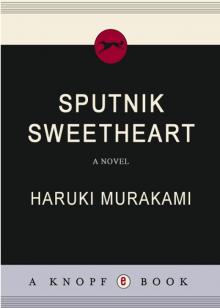 Sputnik Sweetheart
Sputnik Sweetheart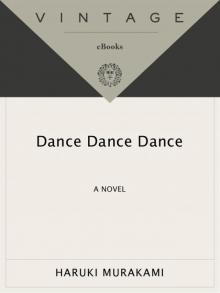 Dance Dance Dance
Dance Dance Dance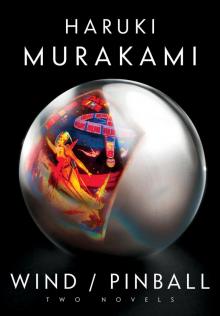 The Wind (1) and Up Bird Chronicle (2)
The Wind (1) and Up Bird Chronicle (2) Blind Willow, Sleeping Woman
Blind Willow, Sleeping Woman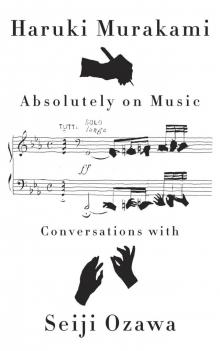 Absolutely on Music: Conversations With Seiji Ozawa
Absolutely on Music: Conversations With Seiji Ozawa Norwegian Wood
Norwegian Wood South of the Border, West of the Sun
South of the Border, West of the Sun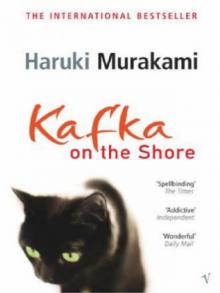 Kafka on the Shore
Kafka on the Shore Men Without Women
Men Without Women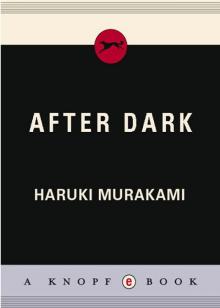 After Dark
After Dark Hard-Boiled Wonderland and the End of the World
Hard-Boiled Wonderland and the End of the World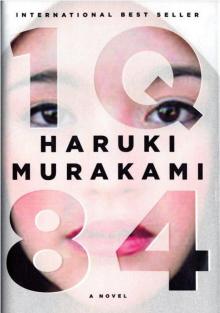 1q84
1q84 The Wind-Up Bird Chronicle
The Wind-Up Bird Chronicle Underground: The Tokyo Gas Attack and the Japanese Psyche
Underground: The Tokyo Gas Attack and the Japanese Psyche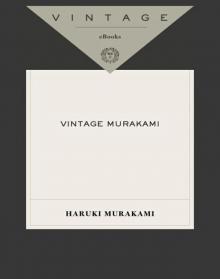 Vintage Murakami
Vintage Murakami The Elephant Vanishes: Stories
The Elephant Vanishes: Stories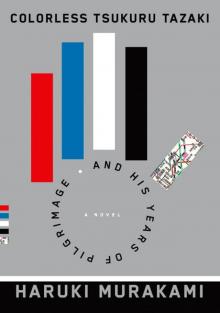 Colorless Tsukuru Tazaki and His Years of Pilgrimage
Colorless Tsukuru Tazaki and His Years of Pilgrimage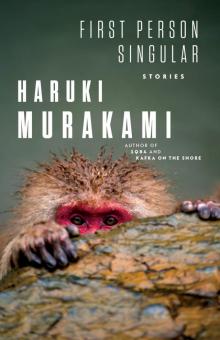 First Person Singular
First Person Singular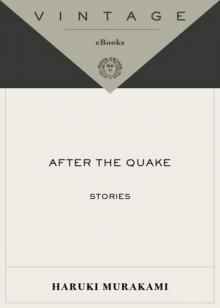 After the Quake
After the Quake A Wild Sheep Chase
A Wild Sheep Chase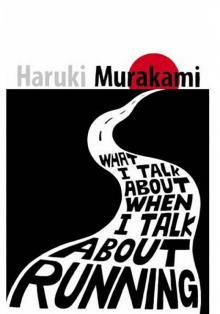 What I Talk About When I Talk About Running
What I Talk About When I Talk About Running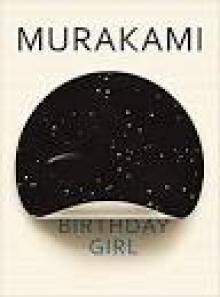 Birthday Girl
Birthday Girl The Elephant Vanishes
The Elephant Vanishes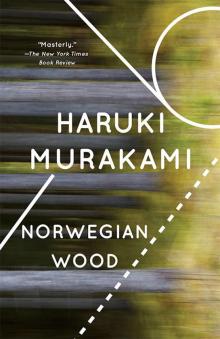 Norwegian Wood (Vintage International)
Norwegian Wood (Vintage International)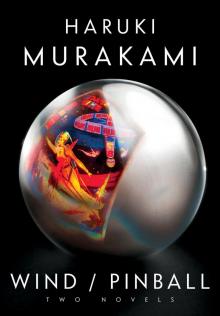 Wind/Pinball
Wind/Pinball Norwegian Wood Vol 1.
Norwegian Wood Vol 1. Underground
Underground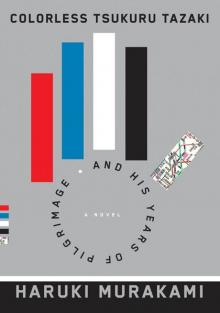 Colorless Tsukuru Tazaki and His Years of Pilgrimage: A novel
Colorless Tsukuru Tazaki and His Years of Pilgrimage: A novel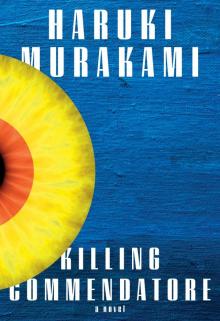 Killing Commendatore
Killing Commendatore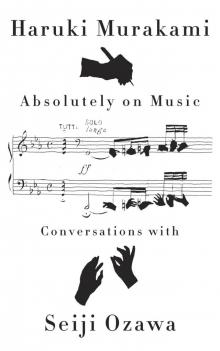 Absolutely on Music
Absolutely on Music